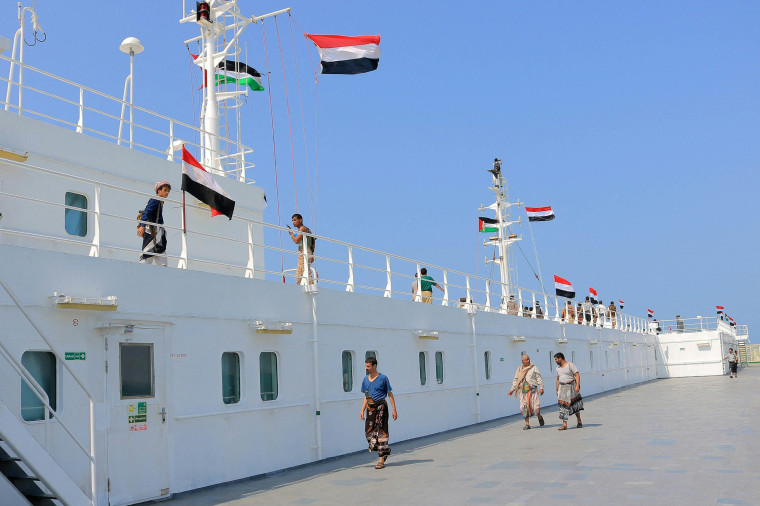Iran goes public with stark warning over suspected spy ship as U.S. refuses to
ERBIL, Iraq — After a weekend of U.S. strikes against its proxies in Iraq, Syria and Yemen, Iran has issued a strongly worded warning not to target a ship that U.S. officials and analysts suspect of providing real-time intelligence for attacks on other vessels in the Red Sea and serving as a forward operating base for its commandos.
In a slickly produced video published on the Iranian army’s Telegram channel Sunday, a narrator says in English that “those engaging in terrorist activities against the MV Behshad or similar vessels, jeopardize international maritime routes, security and assume global responsibility for potential future international risks.”
Describing the Behshad as a “floating armory,” the narrator says it is involved in missions to “counteract piracy in the Red Sea and the Gulf of Aden,” although Iran is not publicly known to have taken part in any recent anti-piracy campaigns in the region.
The video ends with footage of what appears to be ships in an American carrier group flashing red as though they are being targeted. A man then lowers the U.S. flag.

Asked by NBC News about the ship Monday, Defense Department press secretary Maj Gen. Patrick Ryder said, “I am not aware of the U.S. targeting the Behshad. We are very well aware of the ship.”
The Behshad is registered as a commercial cargo ship with a Tehran-based company that the U.S. Treasury has sanctioned as allegedly being a front for the state-run Islamic Republic of Iran Shipping Lines.
The Iranian ship provides electronic intelligence to the Houthis, enabling them to spot and target vessels in the Red Sea region, according to a U.S. official, a U.S. congressional aide with knowledge of the matter and a Middle Eastern official.
Rear Adm. Marc Miguez, the commander of the Dwight D. Eisenhower aircraft carrier strike group currently assigned the task of safeguarding commercial shipping in the Red Sea, told NBC News that Houthi forces are receiving help from Iran to strike at cargo vessels, although he did not directly mention the Behshad.
“They are using intelligence from Iran to give them some targeting information,” he said.
Several military analysts have drawn the same conclusion, including Michael Knights of the Washington Institute for Near East Policy, a Washington-based pro-Israel think tank, whose research focuses on Iranian proxies.
“The ships pretend to be anti-piracy garrison ships that Iranian and Syrian shipping can visit, but actually they are transshipment points for Iranian weapons,” he said, adding that military trainers for the Tehran-backed Hezbollah group in Lebanon also use them.
“The Behshad and its sister vessel Safiz are also loaded with Iranian electronic intelligence equipment used to locate target vessels for the Houthis to strike,” Knights said.
NBC News has been monitoring the vessel using shipping tracking data and found that it has lingered in exactly the same spot in the south of the Red Sea between Yemen and Eritrea, from at least January 2023.

After raising anchor Jan. 4 this year, it sailed south toward the Gulf of Aden. And since Jan. 11, it has moved around the Bab al-Mandeb strait — or “the Gate of Grief” — a 16-mile stretch of water that is the entrance to the Red Sea and a choke point where it would be easy to monitor traffic passing into and out of the waterway.
Analysis by NBC News and several other experts has shown that the Behshad was several miles away as Houthi rebels carried out a number of attacks on commercial vessels. The rebel group has said it will continue the strikes until Israel stops its war against Hamas in Gaza.
These attacks have created a huge wave of ship diversions since December and delays in the global supply chain. Shipping giants such as Maersk and MSC have instead chosen to sail around the Cape of Good Hope, adding one to two weeks to their journeys and substantially increasing their cost.
“It’s a sort of open secret within government circles that this ship is causing us quite significant problems,” said Charles Lister, a senior fellow at the Middle East Institute, a Washington-based think tank. “Wherever the Behshad goes happens to be more or less where the Houthis happen to be targeting their anti-ship ballistic missiles, suicide drones and suicide boats,” he added.
Without mentioning the Behshad, National Security Council spokeswoman Adrienne Watson also accused Iran in December of being “deeply…
Read More: Iran goes public with stark warning over suspected spy ship as U.S. refuses to

